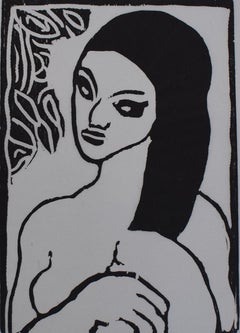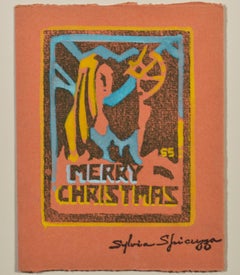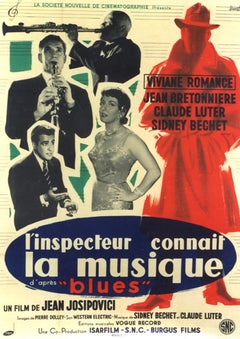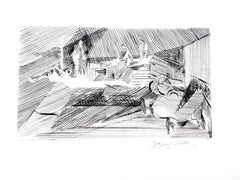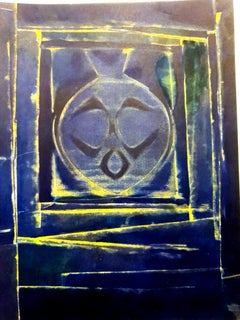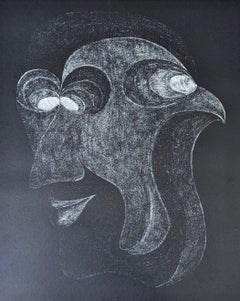1950s Figurative Prints
to
1,182
1,748
291
171
55
33
Overall Width
to
Overall Height
to
1,056
273
257
121
80
68
22
17
16
4
4
2
244
58
55
50
47
3,530
7,599
25,381
6,824
292
597
1,410
1,238
1,330
2,298
3,258
5,178
2,833
1,340
3,027
1,758
522
11
1,518
950
856
581
510
383
367
299
188
102
93
92
77
75
66
57
52
46
40
39
1,567
381
148
120
84
124
551
1,379
777
Period: 1950s
Young girl Combing her Hair - Signed Woodcut - Fauve Art
Located in London, GB
MAURICE DE VLAMINCK 1876-1958
Paris 1876-1958 Rueil-la-Gadelière, Eure-et-Loir (French)
Title: Young girl Combing her Hair Jeune fille se coiffant, 1906/1957
Technique: Original Hand Signed and Numbered Woodcut...
Category
Fauvist 1950s Figurative Prints
Materials
Woodcut
"Merry Christmas, " Original Color Woodcut signed with stamp by Sylvia Spicuzza
Located in Milwaukee, WI
"Merry Christmas" is an original color woodcut on paper by Sylvia Spicuzza. The artist stamped her signature lower right. This artwork features the an abstracted figure on orange p...
Category
American Modern 1950s Figurative Prints
Materials
Woodcut
Inspecteur Connait La Musique
Located in New York, NY
Original Vintage 1956 Poster
La Nouvelle Societe de Cinématographie Present
Inspecteur Connait La Musique. Color Lithograph on Linen.
Category
Modern 1950s Figurative Prints
Materials
Lithograph
Jacques Villon - Cubist Landscape - Original Etching
Located in Collonge Bellerive, Geneve, CH
Jacques Villon - Cubist Landscape - Original Etching
Circa 1950
Signed in pencil
Jacques Villon (1875 - 1963)
Jacques Villon was born Gaston Duchamp on July 31, 1875, in Damville,...
Category
Modern 1950s Figurative Prints
Materials
Etching
(after) Max Ernst - Blue Bird - Stencil
Located in Collonge Bellerive, Geneve, CH
Max Ernst (after) - Blue Bird - Stencil
Published in the deluxe art review, XXe Siecle, 1958
Dimensions: 32 x 25 cm
Publisher: G. di San Lazzaro.
Max Ernst was born in Bruhl, a place near Cologne, in Germany. He was raised in a strict Catholic family, and both of his parents were disciplinarians who were dedicated to training their children into God-fearing and talented individuals. Although his father was deaf, Ernst learned so much from him, particularly when it comes to painting. In fact, much of his early years were lived under the inspiration of his father who was also a teacher. He was the one who introduced painting to Ernst at an early age.
In 1914, Ernst attended the University of Bonn where he studied philosophy. However, he eventually dropped out of school because he was more interested in the arts. He claimed that his primary sources of interest included anything that had something to do with painting. Moreover, he became fascinated with psychology, among other subjects in school.
Primarily, Ernst's love for painting was the main reason why he became deeply interested with this craft and decided to pursue it later on in his life. During his early years, he became familiar with the works of some of the greatest artists of all time including Claude Monet, Paul Cezanne and Vincent van Gogh. He was also drawn to themes such as fantasy and dream imagery, which were among the common subjects of the works of Giorgio de Chirico.
During World War I, Ernst was forced to join the German Army, and he became a part of the artillery division that exposed him greatly to the drama of warfare. A soldier in the War, Ernst emerged deeply traumatized and highly critical of western culture. These charged sentiments directly fed into his vision of the modern world as irrational, an idea that became the basis of his artwork. Ernst's artistic vision, along with his humor and verve come through strongly in his Dada and Surrealists works; Ernst was a pioneer of both movements.
It was Ernst's memories of the war and his childhood that helps him create absurd, yet interesting scenes in his artworks. Soon, he took his passion for the arts seriously when he returned to Germany after the war. With Jean Arp, a poet and artist, Ernst formed a group for artists in Cologne. He also developed a close relationship with fellow artists in Paris who propagated Avant-Garde artworks.
In 1919, Ernst started creating some of his first collages, where he made use of various materials including illustrated catalogs and some manuals that produced a somewhat futuristic image. His unique masterpieces allowed Ernst to create his very own world of dreams and fantasy, which eventually helped heal his personal issues and trauma. In addition to painting and creating collages, Ernst also edited some journals. He also made a few sculptures that were rather queer in appearance.
In 1920s, influenced by the writings of psychologist Sigmund Freud, the literary, intellectual, and artistic movement called Surrealism sought a revolution against the constraints of the rational mind; and by extension, they saw the rules of a society as oppressive. Surrealism also embraces a Marxist ideology that demands an orthodox approach to history as a product of the material interaction of collective interests, and many renown Surrealism artists later on became 20th century Counterculture symbols such as Marxist Che Guevara. In 1922 Ernst moved to Paris, where the surrealists were gathering around Andre Breton. In 1923 Ernst finished Men Shall Know Nothing of This, known as the first Surrealist painting. Ernst was one of the first artists who apply The Interpretation of Dreams by Freud to investigate his deep psyche in order to explore the source of his own creativity. While turning inwards unto himself, Ernst was also tapping into the universal unconscious with its common dream imagery.
Despite his strange styles, Ernst gained quite a reputation that earned him some followers throughout his life. He even helped shape the trend of American art during the mid-century, thanks to his brilliant and extraordinary ideas that were unlike those of other artists during his time. Ernst also became friends with Peggy Guggenheim, which inspired him to develop close ties with the abstract expressionists.
When Ernst lived in Sedona, he became deeply fascinated with the Southwest Native American navajo art. In fact, the technique used in this artwork inspired him and paved the way for him to create paintings that depicted this style. Thus, Ernst became a main figure of this art technique, including the rituals and spiritual traditions included in this form of art. Pollock, aside from the other younger generations of abstract expressionists, was also inspired by sand painting of the Southwest...
Category
Surrealist 1950s Figurative Prints
Materials
Stencil
1973 Mid-Century Figurative Signed Swedish Lithograph, Unframed - Two Faces
Located in Bristol, GB
TWO FACES
Sheet size: 50 x 37 cm
Image size: 37.5 x 30 cm
Lithograph on paper
A mid century limited edition (7/23) etching, signed to the lower edge and dated 1973.
It is signed, d...
Category
Abstract 1950s Figurative Prints
Materials
Lithograph
Char noir (Char V) - Etching, Greek, Mythology, Acient, Horse, Chariot
Located in Köln, DE
Etching and aquatint in colour "Char noir (Char V)" (Black Chariot, Chariot V) by Georges Braque from 1958.
The edition on BFK RIVES comprises approx. 75 copies.
The present copy...
Category
Modern 1950s Figurative Prints
Materials
Etching, Color, Aquatint
Le poète - lithograph, greek, acient, profile, bird, flowers
Located in Köln, DE
Lithograph in colours "Le poète" (The poet) by Georges Braque from 1958 for "Cinq poésies en hommage à Georges Braque" (Five poems in honour of Georges Braque) by René Char.
The boo...
Category
Modern 1950s Figurative Prints
Materials
Color, Lithograph
Feuillage en couleurs - Modern, Aquatint, Embossing, Plant, Leaves, Still Life
Located in Köln, DE
Colour aquatint with embossing ""Feuillage en couleurs" (Colourful Leaves) by Georges Braque from 1956.
The edition on BFK RIVES cromprises approx. 80 copies.
The present copy is ...
Category
Modern 1950s Figurative Prints
Materials
Color, Etching, Aquatint
The Bath
By Paul Cadmus
Located in New York, NY
The Bath
1953/1979
Signed, titled, and numbered in pencil, recto; Also blindstamped, l.l.
Etching (Edition of 35)
28 x 14.5 inches, sheet
Category
Contemporary 1950s Figurative Prints
Materials
Etching
Price Upon Request
" Hermès " famous one!
By Jean Cocteau
Located in CANNES, FR
Jean Cocteau ( 1889 - 1963 )
" Hermes " rare and famous terracotta plate partially glazed .embossed background .
signed Jean Cocteau 1958 . original serie conceived in 1958 an...
Category
Art Deco 1950s Figurative Prints
Materials
Ceramic
Price Upon Request
Untitled (Christian Symbol) from the North African Collage series
Located in Palo Alto, CA
Created in 1952, this Engraving, paper, cut paper, tissue paper and graphite on paper mounted on paperboard is hand-signed by Robert Rauschenberg (Port Arthur, 1925 - Captiva, 2008) in pencil in the lower left margin. Numbered from the edition of 65 in pencil in the lower left margin.
About the Framing:
Framed to museum-grade, conservation standards, Robert Rauschenberg Untitled (Christian Symbol) from the North African Collage...
Category
Modern 1950s Figurative Prints
Materials
Paper, Tissue Paper, Graphite, Engraving
Mobile (The Inventor)
By Paul Cadmus
Located in New York, NY
Mobile (The Inventor)
1953
Signed and numbered
Serigraph
15.813 x 21.125 inches (40.2 x 53.7 cm)
Contact gallery for price.
This work is offered by C...
Category
Contemporary 1950s Figurative Prints
Materials
Screen
Price Upon Request
Maternité (Maternity), 1954
By Marc Chagall
Located in Palo Alto, CA
Created in 1954, this color lithograph is After Marc Chagall (Vitebsk, 1887- Saint-Paul, 1985). Printed on Arches wove paper by Charles Sorlier under the direction of Chagall. This work is numbered 97 from the edition of 300 and there were artist proofs; published by Editions Galerie Maeght, Paris and printed by Charles Sorlier under the direction of Marc Chagall.
The color, composition and execution of Marc Chagall Maternité...
Category
Modern 1950s Figurative Prints
Materials
Lithograph
$22,000 Sale Price
37% Off
Le Christ a l'Horloge, Paris
By Marc Chagall
Located in Missouri, MO
Marc Chagall
"Le Christ a l'Horloge, Paris" (Christ in the Clock) 1957 (M. 196)
Color Lithograph on Arches Wove Paper
Signed in Pencil "Marc Chagall" Lower Right
Initialed "H.C." (Hors Commerce) Lower Left, aside from numbered edition of 90
*Floated in Gold Frame with Linen Matting, UV Plexiglass
Sheet Size: 18 3/4 x 14 3/4 inches (47.5 cm x 38 cm)
Image Size: 9 3/4 x 8 1/2 inches
Framed Size: 28.5 x 24.25 inches
Marc Chagall was a man of keen intelligence, a shrewd observer of the contemporary scene, with a great sympathy for human suffering. He was born on July 7, 1887 in Vitebsk, Russia; his original name was Moishe Shagal (Segal), but when he became a foremost member of the Ecole de Paris, he adopted French citizenship and the French spelling of his name. Vitebsk was a good-sized Russian town of over 60,000, not a shtetl. His father supported a wife and eight children as a worker in a herring-pickling plant.
Sheltered by the Jewish commandment against graven images, the young Chagall never saw so much as a drawing until, one day, he watched a schoolmate copying a magazine illustration. He was ridiculed for his astonishment, but he began copying and improvising from magazines. Both Chagall's parents reluctantly agreed to let him study with Yehuda Pen, a Jewish artist in Vitebsk. Later, in 1906, they allowed their son to study in St. Petersburg, where he was exposed to Russian Iconography and folk art. At that time, Jews could leave the Pale only for business and employment and were required to carry a permit. Chagall, who was in St. Petersburg without a permit, was imprisoned briefly.
His first wife, Bella Rosenfeld, was a product of a rich cultivated and intellectual group of Jews in Vitebsk. Chagall was made commissar for the arts for the area, charged with directing its cultural life and establishing an art school. Russian folklore, peasant life and landscapes persisted in his work all his life. In 1910 a rich patron, a lawyer named Vinaver, staked him to a crucial trip to Paris, where young artists were revolutionizing art. He also sent him a handsome allowance of 125 francs (in those days about $24) each month. Chagall rejected cubism, fauvism and futurism, but remained in Paris. He found a studio near Montparnasse in a famous twelve-sided wooden structure divided into wedge-shaped rooms. Chaim Soutine, a fellow Russian Jew, and Modigliani lived on the same floor. To Chagall's astonishment, he found himself heralded as one of the fathers of surrealism. In 1923, a delegation of Max Ernst, Paul Eluard and Gala (later Salvador Dali's wife) actually knelt before Chagall, begging him to join their ranks. He refused.
To understand Chagall's work, it is necessary to know that he was born a Hasidic Jew, heir to mysticism and a world of the spirit, steeped in Jewish lore and reared in the Yiddish language. The Hasidim had a special feeling for animals, which they tried not to overburden. In the mysterious world of Kabbala and fantastic ancient legends of Chagall's youth, the imaginary was as important as the real. His extraordinary use of color also grew out of his dream world; he did not use color realistically, but for emotional effect and to serve the needs of his design. Most of his favorite themes, though superficially light and trivial, mask dark and somber thoughts. The circus he views as a mirror of life; the crucifixion as a tragic theme, used as a parallel to the historic Jewish condition, but he is perhaps best known for the rapturous lovers he painted all his life. His love of music is a theme that runs through his paintings.
After a brief period in Berlin, Chagall, Bella and their young daughter, Ida, moved to Paris and in 1937 they assumed French citizenship. When France fell, Chagall accepted an invitation from the Museum of Modern Art to immigrate to the United States. He was arrested and imprisoned in Marseilles for a short time, but was still able to immigrate with his family. The Nazi onslaught caught Chagall in Vichy, France, preoccupied with his work. He was loath to leave; his friend Varian Fry rescued him from a police roundup of Jews in Marseille, and packed him, his family and 3500 lbs. of his art works on board a transatlantic ship. The day before he arrived in New York City, June 23, 1941, the Nazis attacked Russia. The United States provided a wartime haven and a climate of liberty for Chagall. In America he spent the war years designing large backdrops for the Ballet.
Bella died suddenly in the United States of a viral infection in September 1944 while summering in upstate New York. He rushed her to a hospital in the Adirondacks, where, hampered by his fragmentary English, they were turned away with the excuse that the hour was too late. The next day she died.
He waited for three years after the war before returning to France. With him went a slender married English girl, Virginia Haggard MacNeil; Chagall fell in love with her and they had a son, David. After seven years she ran off with an indigent photographer. It was an immense blow to Chagall's ego, but soon after, he met Valentine Brodsky, a Russian divorcee designing millinery in London (he called her Fava). She cared for him during the days of his immense fame and glory. They returned to France, to a home and studio in rustic Vence. Chagall loved the country and every day walked through the orchards, terraces, etc. before he went to work.
Chagall died on March 28, 1985 in the south of France. His heirs negotiated an arrangement with the French state allowing them to pay most of their inheritance taxes in works of art. The heirs owed about $30 million to the French government; roughly $23 million of that amount was deemed payable in artworks. Chagall's daughter, Ida and his widow approved the arrangement.
Written and submitted by Jean Ershler Schatz, artist and researcher from Laguna Woods, California.
Sources:
Hannah Grad Goodman in Homage to Chagall in Hadassah Magazine, June 1985
Jack Kroll in Newsweek, April 8, 1985
Andrea Jolles in National Jewish Monthly Magazine, May 1985
Michael Gibson...
Category
Modern 1950s Figurative Prints
Materials
Lithograph
Price Upon Request
The Hymn Singer
Located in Missouri, MO
Signed in Pencil Lower Right
Ed. 500
Circulated by Twayne Publishers, New York City
Image Size: 16 x 12 3/8
Framed Size: 24 1/4 x 20 1/2 inches
The legendary actor actor and musici...
Category
American Realist 1950s Figurative Prints
Materials
Lithograph
Price Upon Request
Promenade
Located in West Hollywood, CA
Presenting an original vintage print by American artist Hans Burkhardt.
"Promenade", is an original vintage print, signed, dated 1958, with an image dimension of 12 x 16 inches, c...
Category
1950s Figurative Prints
Price Upon Request
La Chanteuse de la Radio
Located in West Hollywood, CA
Presenting a sheet after French artist Fernand Leger.
Originally acquired at an Los Angeles gallery exhibition of Leger's lithography in 1961, this is the first time it has been available to sale since originally purchased. The original poster from this Leger exhibition...
Category
Cubist 1950s Figurative Prints
Price Upon Request
Recently Viewed
View AllMore Ways To Browse
Kim Tschang Yeul
Tom Blackwell On Sale
Tom Everhart Lithograph
Torii Kotondo
Victor Richardson
Vintage Boulangerie Signs
Vintage Les Nereides
Vintage Meat Scales
Vintage Multiplier Reel
Warhol Northwest Mask
Whistler Fumette
Yoko Ono Lithograph Harold Town
Zeno Giglietti
Ak47 Lotus
Alex Katz Bicycle
Alex Katz Christy
Alex Katz Twilight
Alex Katz Wedding Dress
